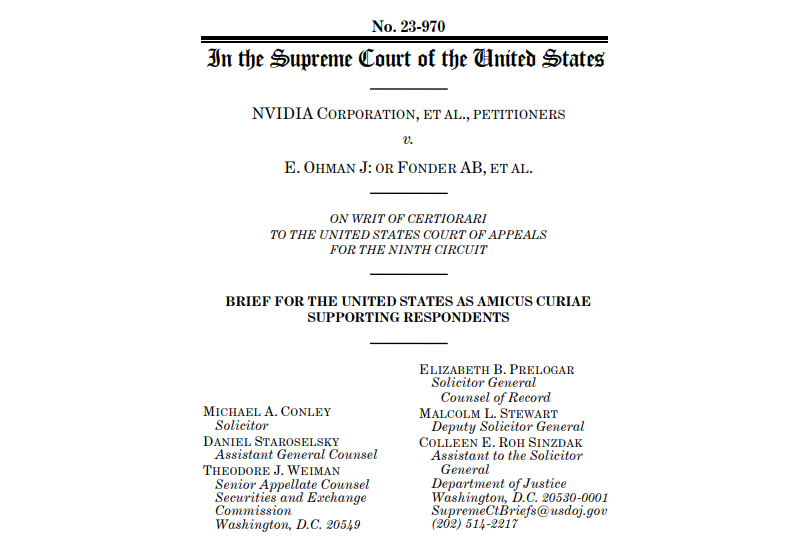The United States is stepping in to support a class-action lawsuit against Nvidia Corp, a leading manufacturer of graphics processing units. The Department of Justice and the Securities and Exchange Commission are petitioning the Supreme Court to revive a lawsuit alleging that Nvidia Corp. misled investors regarding its earnings from cryptocurrency mining, as reported by source. This case, which originated in 2018, has seen numerous developments and is once again in focus.
Government Support For Investors
In an amicus brief submitted on October 2, Solicitor General Elizabeth Prelogar and SEC attorney Theodore Weiman advocated that the case should be brought back to life, citing enough evidence for a renewed investigation. They argued that Nvidia’s leadership, particularly CEO Jensen Huang, had minimized the significance of cryptocurrency mining revenue during a time when those sales were exceptionally high.

The brief emphasizes the necessity of private actions in securities enforcement, indicating that the government has a vested interest in the case. Oral arguments at the Supreme Court are set for November.
In 2021, the Ninth Circuit Court of Appeals dismissed the case due to insufficient evidence. However, it was reinstated in a split panel decision last August after further examination. Investor plaintiffs argue that Nvidia had misrepresented its reliance on revenues from cryptocurrency mining before the significant crash in 2018. They claim Huang’s statements were deceptive, thus establishing grounds for securities fraud liability.
Allegations Against Nvidia
Essentially, the lawsuit alleges that Nvidia misled investors about its financial situation and failed to disclose the extent of its revenues derived from cryptocurrency sales in the market.
Investors contend that this lack of transparency became increasingly apparent when the company’s earnings plummeted after the cryptocurrency crash of 2018. They suggest that Huang was well aware of the company’s dependency on crypto sales but opted to publicly underestimate it.
In response, Nvidia asserts that the investors’ accusations are based on flawed interpretations of its revenue sources. However, investors have provided testimonies from former employees indicating that Huang was involved in discussions about the impact of crypto mining on sales. The Third Circuit accepted this testimony, suggesting Huang possessed a culpable state of mind regarding fraud against investors.
Legal Implications And Future Steps
The involvement of the DOJ and SEC lends additional credibility to the investors’ claims. They argue that treating expert opinions as sufficient evidence of dishonesty or intent would undermine the protections established for investors under the Private Securities Litigation Reform Act (PSLRA). To ensure robust enforcement of securities regulations, the agencies have requested 10 minutes of oral argument time when the case is presented.
Featured image from Vox, chart from TradingView








